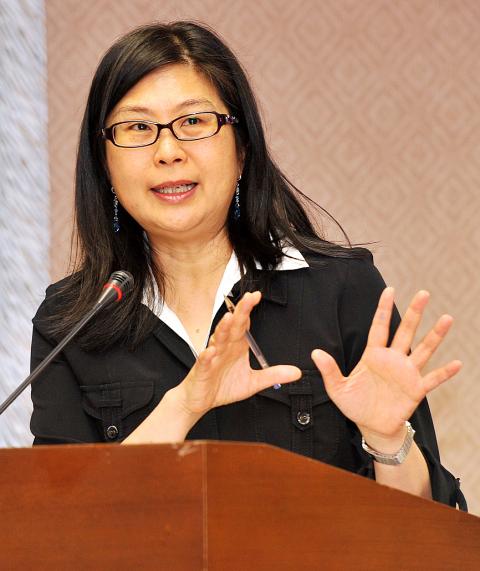|
Lawmakers question government stance
on Chen
Staff writer, with CNA

Mainland Affairs Council Minister
Lai Shin-yuan speaks at the Legislative Yuan yesterday. Lai said Chinese
dissident Chen Guangcheng can visit Taiwan if he is invited by private groups
through the standard procedures.
Photo: Chien Jung-fong, Taipei Times
Democratic Progressive Party (DPP)
lawmakers yesterday questioned Mainland Affairs Council Minister Lai Shin-yuan
(賴幸媛) about the government’s stance on the case of Chinese human rights activist
Chen Guangcheng (陳光誠).
“What did the president say in regard to the case of Chen Guangcheng?” DPP
Legislator Lee Ying-yuan (李應元) asked Lai at a legislative session.
Lai was asked to report on the government’s response to cases of human rights
violations in China since 2008 and the possibility of including human rights
clauses in cross-strait agreements.
Lai said the government’s stance was laid out in a statement the council issued
earlier, in which it called on China to deal with human rights activists in a
“rational and peaceful” way since they “represent a very important voice.”
She also said the Chinese government should ensure legal justice, protect human
rights and carry out political reforms.
Taiwanese “are all watching” how China handles its human rights cases, she said.
Lee also asked if the council would declare its stance on Chen’s case at the
upcoming meeting between top Taiwanese and Chinese negotiators next month.
Lai said the council could ask Straits Exchange Foundation Chairman Chiang
Pin-kung (江丙坤) to raise the issue.
The top-level talks between Chiang and Association for Relations Across the
Taiwan Straits Chairman Chen Yunlin (陳雲林) are expected to address issues such as
investment protection and -customs cooperation.
As to DPP Legislator Chen Ming-wen’s (陳明文) question on whether the government
would invite Chen Guangcheng to Taiwan, Lai said it would be no problem for him
to visit if he were invited by private groups and all procedures were carried
out in accordance with the law.
Chen Guangcheng, a blind activist, escaped house arrest last month and made his
way to the US embassy in Beijing a few days later. He has since expressed a wish
to go to the US, citing concern for the safety of his family if he remained in
China. He spent more than four years in jail on what his supporters said were
trumped-up charges.
Asked by Chinese Nationalist Party (KMT) Legislator Chiang Chi-chen (江啟臣)
whether she viewed the Chinese activist as a dissident or a human rights
fighter, Lai said he was a “civil rights activist.”
DPP Legislator Lee Chun-yee (李俊毅) asked why the council was no longer updating
the information on its Web site about cases of human rights violations in China.
Lai said that instead of posting such information on its Web site, the council
has provided a link to a foundation that releases more comprehensive reports on
the human rights situation in China.
The minister urged China to actively respond to its people’s calls for greater
freedom, democracy, justice and human rights protection.
“The human rights issue is an indicator of the distance between the two sides of
the Taiwan Strait,” she said.
|
![]()
![]()
![]()